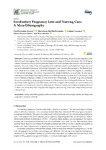Involuntary pregnancy loss and nursing care: a meta-ethnography

Use this link to cite
http://hdl.handle.net/2183/25084Collections
- Investigación (FEP) [507]
Metadata
Show full item recordTitle
Involuntary pregnancy loss and nursing care: a meta-ethnographyAuthor(s)
Date
2020-02-25Citation
Fernández-Basanta S, Movilla-Fernández MJ, Coronado C, et al. Involuntary pregnancy loss and nursing care: a meta-ethnography. Int. J. Environ. Res. Public Health. 2020; 17(5):1486
Abstract
[Abstract]
Healthcare professionals find the care of parents following an involuntary pregnancy loss
stressful and challenging. They also feel unprepared to support bereaved parents. The challenging
nature of this support may have a personal impact on health professionals and the care provided to
parents. The aim of this meta-ethnography is to synthesise nurses’ and midwives’ experiences of
caring for parents following an involuntary pregnancy loss. A meta-ethnography of ten studies from
five countries was carried out. GRADE CERQual was assessed to show the degree of confidence
in the review findings. An overarching metaphor, caring in darkness, accompanied by five major
themes provided interpretive explanations about the experiences of nurses and midwives in caring
for involuntary pregnancy losses: (1) Forces that turn off the light, (2) strength to go into darkness,
(3) avoiding stumbling, (4) groping in darkness, and (5) wounded after dealing with darkness. Nursing
staff dealt with organizational difficulties, which encouraged task-focused care and avoidance of
encounters and emotional connection with parents. However, nurses and midwives might go beyond
in their care when they had competencies, support, and a strong value base, despite the personal
cost involved.
Keywords
Caring
Meta-ethnography
Meta-synthesis
Midwives
Miscarriage
Nurses
Perinatal loss
Qualitative research
Stillbirth
Meta-ethnography
Meta-synthesis
Midwives
Miscarriage
Nurses
Perinatal loss
Qualitative research
Stillbirth
Editor version
Rights
Atribución 3.0 España






